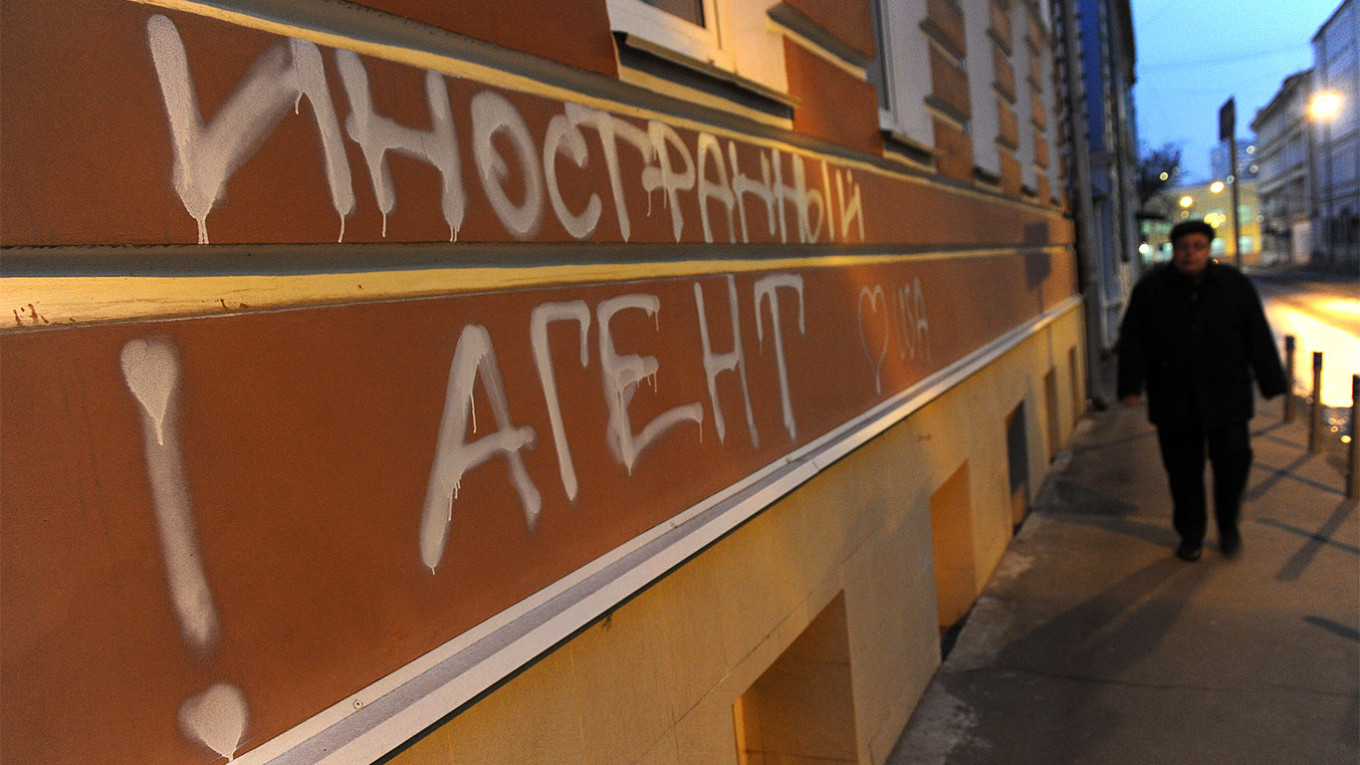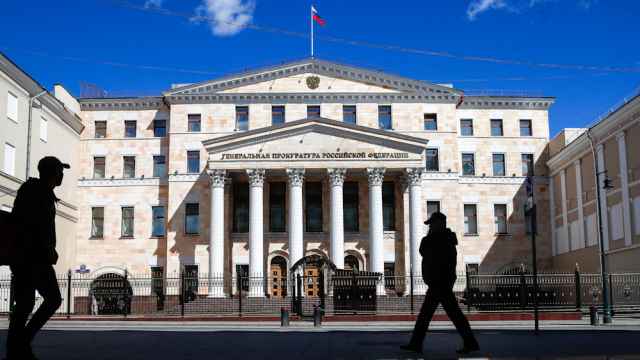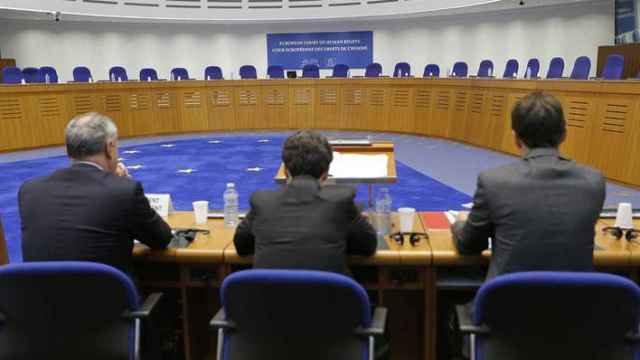In 2012, the status of "foreign agent" was introduced into Russian legislation for non-governmental organizations (NGO) that received foreign financial support and engaged in what the authorities considered political activities in the Russian Federation. On Dec. 1, 2022, a new law was enacted that required them to identify themselves as foreign agents in any media or appearance.
The identification statement is 24 words in Russian that must be written at the top of any communication: “This communication (material) was created and/or disseminated by a foreign media that is carrying out the function of a foreign agent and by a Russian legal entity that is carrying out the function of a foreign agent.”
In Russian, “foreign agent” is synonymous with “spy.”
Packing up shop
Since 2013, more than 550 individuals and organizations have been included in the register of foreign agents. If an organization recognized as a foreign agent doesn’t register itself, it must immediately pay a fine of 100,000 to 400,000 rubles ($1,295-5,181). If the fine is not paid within 60 days, a new fine is levied.
Many people are afraid to work with an organization like this. For some NGOs, when they were called foreign agents, their work came to an end.
In 2015, the Freedom of Information Foundation was declared a foreign agent. The foundation had been working since 2004 carrying out studies, analysis, and implementation of the constitutional right of citizens and organizations to access information. After it was branded with this new status, it closed its doors.
The charitable foundation "Svecha" (“Candle”) also closed after being identified as a foreign agent. The organization provided care to HIV-positive patients. The authorities deemed posts by the head of the foundation on the personal Facebook page to constitute “political activities."
The Saratov Regional Organization for Diabetics; the Center for Support of Indigenous Peoples of the North; the Arkhangelsk regional youth environmental public organization "Etas" — these are just a few of the many organizations that also closed for the same reason. Being a “foreign agent” was a death sentence.
Adapting to the new reality
Now many “foreign agent” NGOs are like hunted prey. The Moscow Times tried to contact several LGBT organizations, some of which relocated abroad, but no one was willing to talk. "How can I be sure that you are not from a state organization? If I tell you about us, you could arrest me and my friends," one of the members of an LGBT organization said.
In 2023, the Free Buryatia Foundation was declared a foreign agent. Members of the foundation wrote about mobilization efforts in Buryatia and stated that they were against the invasion of Ukraine. According to Mediazona (also a “foreign agent”), Buryatia is one of the Russian regions with the highest number of deaths since the beginning of the war. Today most employees of the foundation live abroad.
During 2022–2023, some ecological organizations were declared foreign agents, including the seemingly innocuous Salmon Research Center, Sakhalin Environmental Watch, and WWF Russia. The official reason was receiving foreign financial support. Today some are in the stage of liquidation. The World Wildlife Fund (WWF) Russia declined to give an official comment to The Moscow Times, but the WWF site has a video message from its director, Dmitry Gorshkov, saying that WWF Russia is continuing its work.
Carrying on
Despite difficulties, some NGOs continue their work even as foreign agents.
In 2020, the center “Nasiliu.Net” (No To Violence) which tries to break the silence about domestic violence in Russia, was declared a foreign agent. In 2023, its leader Anna Rivina received the same status as an individual.
"I’m sure the main reason was connected with our activities concerning the law on the prevention of domestic violence, which was not passed. All the accusations against me were connected with statements I made in interviews. For example, the accusation cited what I said in an interview to Forbes — I said that if the state dealt with domestic violence, projects like ours would not be needed. The authorities also don’t like the fact that we produce articles about discrimination against the LGBT community."
Foreign financial support was about 7% of the total budget, so Anna Rivina decided to decline foreign donations, hoping that would get her off the register. Now she has abandoned that hope.
Rivina told The Moscow Times there were some women volunteers who said that they could not afford to work in an organization considered a foreign agent. But on the other hand, donations almost doubled — Russians began to support the foundation. But that didn’t solve the group’s problems. "Unfortunately, our previous projects with business and the government ceased. Today just a few editors are willing to write about us. We can’t give lectures or participate in festivals. Informational materials must be labeled. It is hard on the team," Rivina said.
In the Nizhny Novgorod region, a soldier on leave from the war in Ukraine came home and killed his wife. Rivina believes there will be more stories like this, in part because women can’t talk about domestic violence and get information about warning signs, learn how to de-escalate potentially violent situations, and find out who to turn to for help. “Russians should be prepared to hear about more murders,” Rivina said.
There are a few foreign agent stories with happier endings. The Conscript’s School of Law conducts lectures for conscripts and provides individual consultations. In 2023, it was included in the register of foreign agents for the second time. The first time was in 2016, because the domain name was paid for by the foreign Legal Mission Foundation — a donation of 600 rubles ($7) per year. A year later the organization was removed from the register of foreign agents.
According to Alexei Tabalov, the lawyer who runs the Conscript’s School of Law, their work hasn’t changed other than more financial reporting. “Now we have to put a special marker on informational materials, but that’s all, and they can be reposted. If we forget something, we can be fined, and some of our employees live abroad. We were afraid that there would be a negative reaction from people, but our status as foreign agents had no effect. When people need help, it doesn't matter to them who gives it — foreign agent or not.”
A Message from The Moscow Times:
Dear readers,
We are facing unprecedented challenges. Russia's Prosecutor General's Office has designated The Moscow Times as an "undesirable" organization, criminalizing our work and putting our staff at risk of prosecution. This follows our earlier unjust labeling as a "foreign agent."
These actions are direct attempts to silence independent journalism in Russia. The authorities claim our work "discredits the decisions of the Russian leadership." We see things differently: we strive to provide accurate, unbiased reporting on Russia.
We, the journalists of The Moscow Times, refuse to be silenced. But to continue our work, we need your help.
Your support, no matter how small, makes a world of difference. If you can, please support us monthly starting from just $2. It's quick to set up, and every contribution makes a significant impact.
By supporting The Moscow Times, you're defending open, independent journalism in the face of repression. Thank you for standing with us.
Remind me later.






